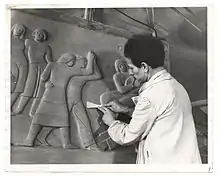Cesare Stea
Cesare Stea (August 17, 1893 – 1960) was an American sculptor and painter.
Cesare Stea | |
|---|---|
 Cesare Stea, from the Archives of American Art | |
| Born | 1893 |
| Died | 1960 (aged 66–67) New York City |
| Nationality | American |
| Education | Beaux-Arts Institute of Design, Académie de la Grande Chaumière |
| Known for | Sculpture, muralist |
Life
Stea was born in Bari, Italy. He studied at the Beaux-Arts Institute of Design, National Academy of Design, Cooper Union and the Académie de la Grande Chaumière, where he studied with Antoine Bourdelle. He variously studied with Hermon McNeil, Sterling Calder and Solon Borglum.[1]
He was a member of the Federal Art Project. He created relief sculptures, "Men and Machines" (1939) in Newcomerstown, Ohio,[2] "Industry" (1941) in Wyomissing, Pennsylvania,[3] and "Sculptural Relief" (1936) at Bowery Bay Sewage Disposal Plant.[4] His work can also be found in Whitney Museum of American Art in New York and the Smithsonian Institution's National Portrait Gallery in Washington D.C.[5]
Stea was a member of the National Sculpture Society.
His papers are held at the Archives of American Art.[6]
References
- Opitz, Glenn B, editor, Mantle Fielding's Dictionary of American Painters, Sculptors & Engravers, Apollo Book, Poughkeepsie NY, 1986 p. 891
- Newcomerstown.us The Coshocton Tribune – June 28, 1939. Decorative Bas Relief Is Hung In Lobby of Local Post Office
- New Deal Post Office Art in Pennsylvania Archived April 26, 2012, at the Wayback Machine
- Paul Wood (1993). Modernism in dispute: art since the Forties. Yale University Press. ISBN 978-0-300-05522-1.
- http://siris-artinventories.si.edu/ipac20/ipac.jsp?session=1I72I4B702114.11744&profile=ariall&uri=link=3100006~!204279~!3100001~!3100002&aspect=Browse&menu=search&ri=1&source=~!siartinventories&term=Stea%2C+Cesare%2C+1893-1960%2C+sculptor.&index=AUTHOR
- Cesare Stea papers at the Archives of American Art
External links
- "New York Sculpture during the Federal Project", Eleanor Carr, Art Journal, Vol. 31, No. 4 (Summer, 1972), pp. 397–403
- Cesare Stea at Ask Art